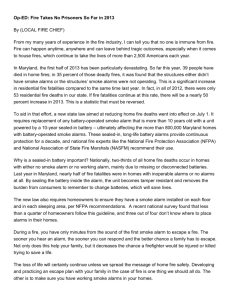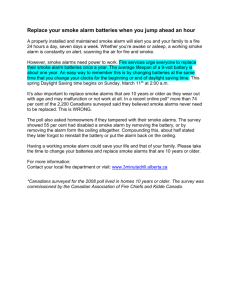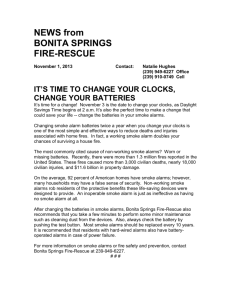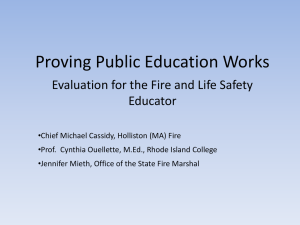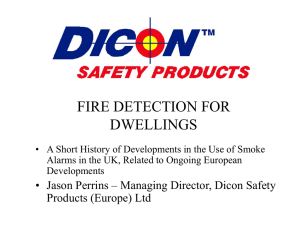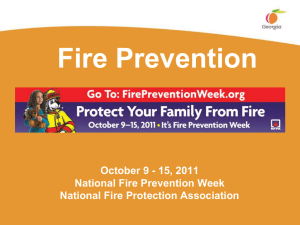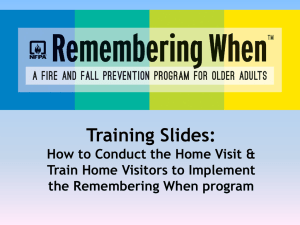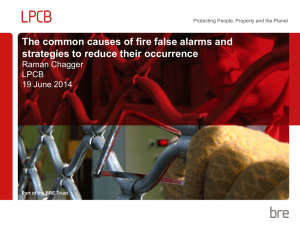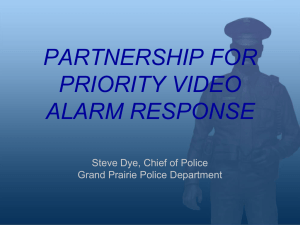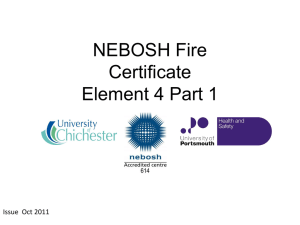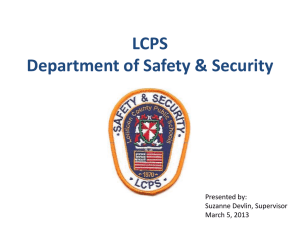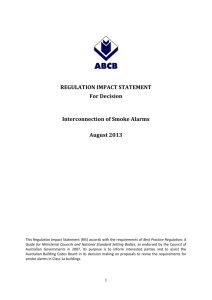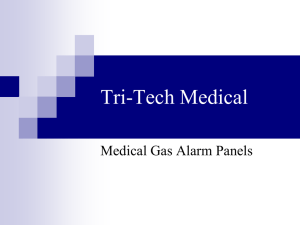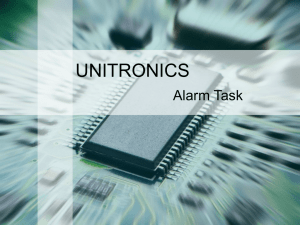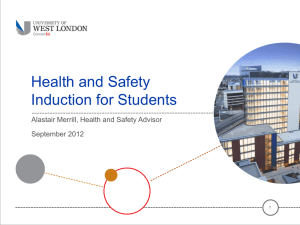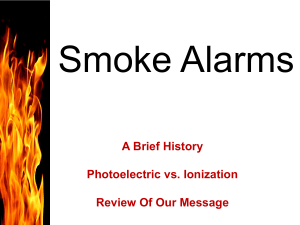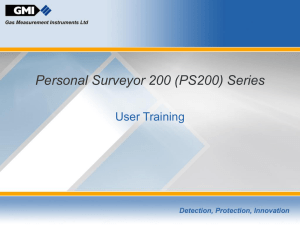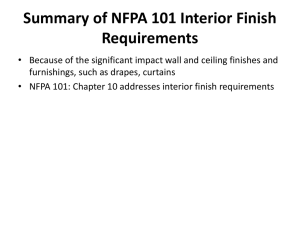What`s Possible? - Fire Marshals Archives
advertisement
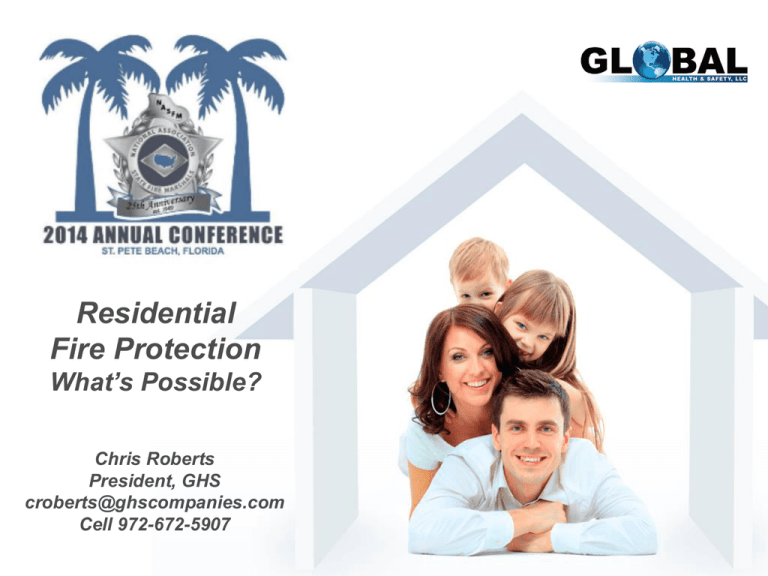
Residential Fire Protection What’s Possible? Chris Roberts President, GHS croberts@ghscompanies.com Cell 972-672-5907 Residential Fire Protection To know where you’re going… You must know where you’ve been… Residential Fire Protection The first single station smoke alarms were made available to the public in the early 1970’s. By 1976, the technology had been redesigned and the cost was low enough that every home could own one. Prior to 1989, every home was either recommended or required to have at least one in the hallway. Residential Fire Protection In 1989, newly constructed residential homes were required to have interconnected (hardwired) smoke alarms on every level of the home and outside the sleeping areas. With interconnected smoke alarms, all the smoke alarms will sound if any individual smoke alarm detects smoke. Residential Fire Protection In 1993, the standard required the installation of hardwired smoke alarms inside bedrooms or sleeping areas. Smoke alarms were required in bedrooms to address the concern associated with sound level losses when occupants sleep with the bedroom doors closed. Residential Fire Protection In 1996, the requirement to have hardwired smoke alarms with battery backup in new construction was added to address non-operability during power outages. The Code saves lives. Member of NFPA Member of Education Section Alternate on NFPA 720 Carbon Monoxide Detection I believe in Codes… I believe in smoke alarms… I believe it all saves lives… But the codes are often reactionary… or at least they have been my whole career… and the law can slow the reaction time to a snail’s pace. Here’s what the NFPA says… 40% of fire deaths occurred with an operating smoke alarm… 23% of fire deaths occurred with a smoke alarm that wasn’t operating… 37% of fire deaths occurred with no smoke alarm… The death rate was much higher in fires in which a smoke alarm was present but did not operate (1.94 out of 100) than it was in home fires with no smoke alarms at all… So the experts and the facts back up what I am going to share… My personal experience from a small sampling of homes in the U.S. Our network of Dealers are in over 36,000 Homes Per Year Over Half Present… • • • • Dead or missing batteries Disconnected wires dangling from the ceiling Old Code Minimums New Style vs Old Style 36,000 Homes Per Year 9 out of 10 Present • • • No Escape Plan No Meeting Place Misconceptions 36,000 Homes Per Year Nearly All • Are missing something… In addition to the lack of residential sprinklers, there are many missing pieces… I didn’t come to share a problem without a solution! Here’s What’s Possible Today! • Wireless Interconnectivity which allows for retrofitting as well as additional products as technology improves • Reliability without consumer responsibility – Self Diagnostics – Long Life Batteries – Microprocessors • Education and Awareness through personal coaching • Early warning of fires in the rooms of origin Crossfire Smoke Crossfire Heat Crossfire Carbon Monoxide CFS10 Smoke Alarm • Photoelectric Sensitivity at 2.1% obscuration • Removable, cleanable smoke chamber • Required protection for bedrooms and hallways • Additional protection for living rooms, dining rooms and other occupied spaces. • Will communicate with all devices on the Crossfire network CFH10 Heat Alarm • Made for hard to protect areas – Attics, Garages, Utility Rooms and Kitchens (The common places where fires can start) • Can handle extreme temperature ranges in these nonclimate controlled spaces… Our San Diego based engineers were shocked that attics can go below 0° • Will communicate with all devices on the Crossfire network CFCO10 Carbon Monoxide Alarm • Required/Recommended protection on every floor of the house (including basements) • Installation not sensitive to wall or ceiling position. Can be used as an easy access Test/Silence button for the whole network • Alarms with the T-4 Warning pattern for an easy to distinguish signal • Will communicate with all devices on the Crossfire network • Fastest reaction time of all CO alarms on the market due to our quartz crystal oscillator (time keeping device) All Units have the following features… • Advanced Feature Highlights: – 10 Year UL Certification – Wireless communication with dual frequency hopping – Lithium Manganese battery that will last the life of the alarm – Heat sensor for Rate of Rise and Fixed Temperature (Heat only is field programmable) – 100 dB horn achieves 89 dB horn at 10 feet – Thick walled, flame retardant ABS and Polycarbonate plastic housing – Quartz Crystal Oscillator – Semi Conductor Driven Micro Processor What’s really possible? • The Crossfire’s radio frequencies are 905.2MHz and 913.2MHz. The radio “hops” between the two frequencies in order to ensure the signal gets through to the other alarms on the network • The alarm only transmits when being tested or during an actual warning situation…therefore it cannot possibly interfere with other electronics in the house (i.e. garage door openers of internet routers) • The alarm’s UL tested range is 200 ft in open space. • If an alarm initiates a fire or CO signal, its red Fire (or CO Warning) light will flash every 32 seconds for three days (no chirping). This can help you locate an alarm that has false alarmed. Pressing the Silence/Test button will stop this. Quality US Manufacturing • All alarms are “burned in” for 16 hours while running the software at a rate 40X faster than normal operation. This process is part of our quality control procedure to weed out alarms that would die of electronic “infant mortality”. No burning or raised temperatures are involved. 2015 and beyond… The Bed Shaker Or more formally known as the Annunciating Accessory for the Hearing Impaired • • • • • • • 520 Hz Square Wave Horn Vibrating “Puck” that gets inserted between the mattress and box springs NOT an alarm…has no detection capability Triggered by the Crossfire radio signal Binds into the network the same way as any new alarm Uses the same display as the Crossfire A Silence/Test button that functions in the same way as the Crossfire The Base Station • Features: – text messages – emails – relay room information – relay maintenance messages: low battery, dirty chamber, etc. • Wi-Fi and/or cellular networks to relay information • Works with existing Crossfire alarms It’s Not About Pretty Lights! • Fire safety isn’t improved by all the fancy lights and voices coming from an alarm. • If a piezo horn isn’t working, it’s doubtful a phone app is going to wake you while you sleep? • Fire safety is about having quality alarms in the right locations! • What is possible in today’s world is to make the finest aspects of commercial fire detection available to homeowners without the wires and the panels and the monitoring fees. • It is possible to make a wireless alarm that does all these things and lasts 10 years or even more. • Interconnected protection for kitchens, attics, garages, basements and utility rooms? These are places where fires commonly start. Thank You! Chris Roberts President, GHS croberts@ghscompanies.com Cell 972-672-5907
